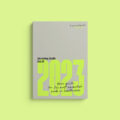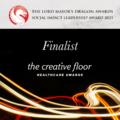
Do you see yourself as a creative person?
Try this test.
Take a brick and list three things you can do with it.
Some people will say 1. Build a house 2. Build a road 3. Build a bridge.
If your top three ideas were 1. Throw through a jeweller’s window, 2. Squash flies 3. Paint white and use as a creative award – you may be destined for a career in the creative industries.
So does something more fundamental separate creatives from people who might class themselves as ‘non-creative’?
My wife and I were watching one of those programmes, of the ‘Escape to’ variety.
Yes, it’s a high-octane life I lead.
This one was about a couple who have bought a château in France and are renovating it beautifully and creatively.
It might even be called ‘Escape to the Château’.
The wife, (his not mine) had bought a new light for one of the bedrooms – off the internet, as you do, and opened up the box upon receiving it with a squeal of delight.
It was a wonderfully decorative flower arrangement style set in brass.
Her husband, a practical man and extremely handy with a jigsaw and a plank of wood, looked on with a look of amused despair, and immediately pointed out that it was a candle holder with no electrical aspect whatsoever.
Not what they needed at all.
My wife ‘tutted’ and remarked ‘that’s such a creative person thing to do’.
(I couldn’t really argue as I had done something similar myself recently with a picture light.)
Because creative people’s brains do work differently to a degree.
But creative or non-creative, we all can tap in to a higher level of creativity if we put our minds to it.
Or rather if we don’t.
A study in the 1970’s at Stanford in California by an academic called Mark Lepper (now a professor of Psychology) took a group of children from the Bing Nursery school located on the Stanford campus, divided them in to three groups and gave all three a set of markers, crayons and paper.
The first group was told there would be a reward for the best picture. An award with their name on it, no less.
The second group was not told anything, but the best picture did receive an ‘unexpected reward’ once they had completed the task.
The third groups were neither promised nor received any award for their work.
The results were astounding. The first group’s work – the one with a clear reward – was considerably worse than the other two.
The findings, at least among these children, clearly showed that reward is not necessarily the best way to increase creativity.
A subsequent experiment divided children in to two groups and again asked them to create a collage – one with no promise of anything and the other with the promise of a prize: An Etcher-sketch!
They then asked judges to come in from the art department and randomly asked them to judge the work.
All of the work from the group with no intrinsic incentive was judged to be significantly poorer.
Weird huh?
So what is your approach to awards and how does this square with those agencies who clearly load the dice with work let’s say…..that is specifically designed to clean up at Cannes etc?
Well, it would at least seem to contradict Lepper’s work at Stanford.
But I suspect the creative motivation for those who produce those winning concepts is less about winning the awards and more about doing something cool.
In fact for anyone who produces great work, it’s never about the awards as a starting point. Not really.
Maybe it just happens that if your approach is to go for cool and interesting first, rather than be fixated on what will win at an awards show, the awards start flowing.
So that brief that’s sitting on your desk? what could you do to give yourself the most fun on a job that you’ve ever had?
What would you like to spend the next three months producing, assuming it works for the brand?
Do that, not that thing you think might delight the judges.
You never know, you might win a brick all of your own.
__
*With special thanks to the freakonomics.com podcast for the inspiration for this blog





